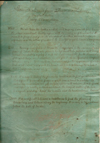Mahatma Letter to H. S. Olcott - LMW 2 No. 23
| Quick Facts | |
|---|---|
| People involved | |
| Written by: | Serapis Bey |
| Received by: | Henry Steel Olcott |
| Sent via: | unknown |
| Dates | |
| Written on: | unknown |
| Received on: | 16 August 1876 |
| Other dates: | none |
| Places | |
| Sent from: | unknown |
| Received at: | New York |
| Via: | none |
This is Letter No. 23 in Letters from the Masters of the Wisdom, Second Series. Mahatma Serapis Bey rebukes Henry Steel Olcott for not defending Helena Petrovna Blavatsky from an acquaintance who spoke against her. Serapis quotes verses from Buddhist texts.[1]
< Prev letter in LMW 2
Next letter in LMW 2 >
< Prev letter to Olcott
Next letter to Olcott >
Page 1 transcription, image, and notes
|
Three Sentences from Dhamma Padam One from Sutras Daily Observances XXII. He who hears his brother reviled, and keeping a smooth face leaves the abuse unnoticed, tacitly agrees with the enemy, as if he admitted the same to be proper and just. He who does it is either mouse-hearted, or selfishness is at the bottom of his heart. He is not fit as yet to become a “companion.” LXI. Revenge is sinful and throws the “companion” in the embrace of and power of Zahak. But he who permits his left hand to be polluted with dung without immediately wiping it with his right cares little for the cleanliness of his whole body. What constitutes the integral? – Parts. Of what is composed a human body? – Of limbs. If one limb cares not for the appearance of another limb, is not Zahak ready with his trowel and brush to blacken the whole? Such a “companion” is not ready to become a Brother. XXXI. It is easy to destroy the poisonous houâbà in its first germination. It is difficult to arrest its progress when once allowed to mature. Its unhealthy emanations will fill the atmosphere with miasms. It will spread and infect its healthy brethren and cause the limpid waters of the lake to stagnate and dry. Avoid the houâbà and its husbandman, Beloved. LXXII. It is as difficult to become a Buddha as to find the flowers of Udumbara and Palaca along the highway. It is easy to try, and even follow the path of Buddha. Translation correct.
|
|
NOTES:
|
Note on back of Page 1
|
Note in Olcott's handwriting: Appeared fastened to [wall] |
NOTES: |
Context and background
Mr. Jinarājadāsa provided this context:
THE document published next is not in the script of the Master Serapis, except the words, “Translation correct. Serapis,” which are in red pencil at the bottom. This document, which is on bluegreen paper, and one later regarding the Theosophist also from the Master, are in the rounded script of Letter 21. Perhaps some pupil wrote, and the Master only signed...
Colonel Olcott writes in pencil at the back of the paper: “Appeared fastened to wall of my room, Aug. 16, 1876, while I was in the room alone.”[2]
Physical description of letter
The original of this letter is preserved at the Theosophical Society, Adyar, Chennai, India.
Publication history
Commentary about this letter
Mr. Jinarājadāsa added this commentary:
In Old Diary Leaves I. pp. 414-5, Colonel Olcott describes under what conditions he received the extracts which form this letter. He says:
I met one day in the lower part of the city (New York) an acquaintance with whom I stopped for a few moments to chat. He was very prejudiced against H.P.B., and spoke very harshly against her, keeping to his opinion despite all I could say. At last he used such objectionable language that, in sheer disgust, I hastily left him and went on my way. I got home as usual in time for dinner, and went to my room . . . to make my toilet . . . After finishing my washing I turned towards the shaving-stand, behind me and just in front of the window, to brush my hair, when I saw something of a green colour reflected in the glass . . . The verses were reproaches to my address for having allowed H.P.B. to be reviled without defending her; Unmistakably referring to my encounter down town with the person I had met, although no names were mentioned.[3]

